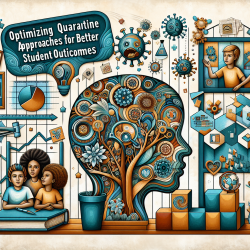Introduction
The SARS-CoV-2 pandemic has significantly impacted the educational landscape, prompting schools to explore various quarantine strategies to balance health safety and educational needs. The research article "Adherence to and experiences of K–12 students in modified and standard home quarantine during the SARS-CoV-2 pandemic in Missouri" provides valuable insights into the effectiveness of different quarantine approaches. This blog aims to help practitioners enhance their skills by implementing research outcomes or encouraging further investigation.
Research Findings
The study conducted in Missouri assessed the adherence to quarantine protocols and the psychosocial impacts on K-12 students and their families. The key findings include:
- Students in modified quarantine (MQ) reported lower adherence to quarantine recommendations compared to those in standard home quarantine (SQ).
- MQ students experienced lower daily impacts and stressors than SQ students.
- Parents of SQ students reported greater stress and negative impacts on family functioning and educational opportunities.
Implications for Practitioners
For speech-language pathologists and other educational practitioners, these findings offer several implications:
- Adapting Quarantine Strategies: Consider advocating for modified quarantine approaches where feasible, as they can reduce stress and maintain educational continuity.
- Supporting Mental Health: Implement interventions that address the mental health impacts of quarantine, especially for students in SQ.
- Enhancing Communication: Use data-driven communication strategies to inform parents and educators about the benefits and limitations of different quarantine approaches.
Encouraging Further Research
While the study provides valuable insights, further research is needed to explore the long-term impacts of quarantine strategies on student outcomes. Practitioners are encouraged to participate in or initiate studies that examine:
- The effectiveness of different quarantine strategies across diverse populations.
- The role of technology and virtual learning in mitigating educational disruptions.
- The impact of quarantine on students with pre-existing mental health conditions.
Conclusion
The research highlights the importance of balancing health measures with educational and psychosocial needs. By leveraging data-driven insights, practitioners can optimize quarantine strategies to support better outcomes for students. To read the original research paper, please follow this link: Adherence to and experiences of K–12 students in modified and standard home quarantine during the SARS-CoV-2 pandemic in Missouri.










